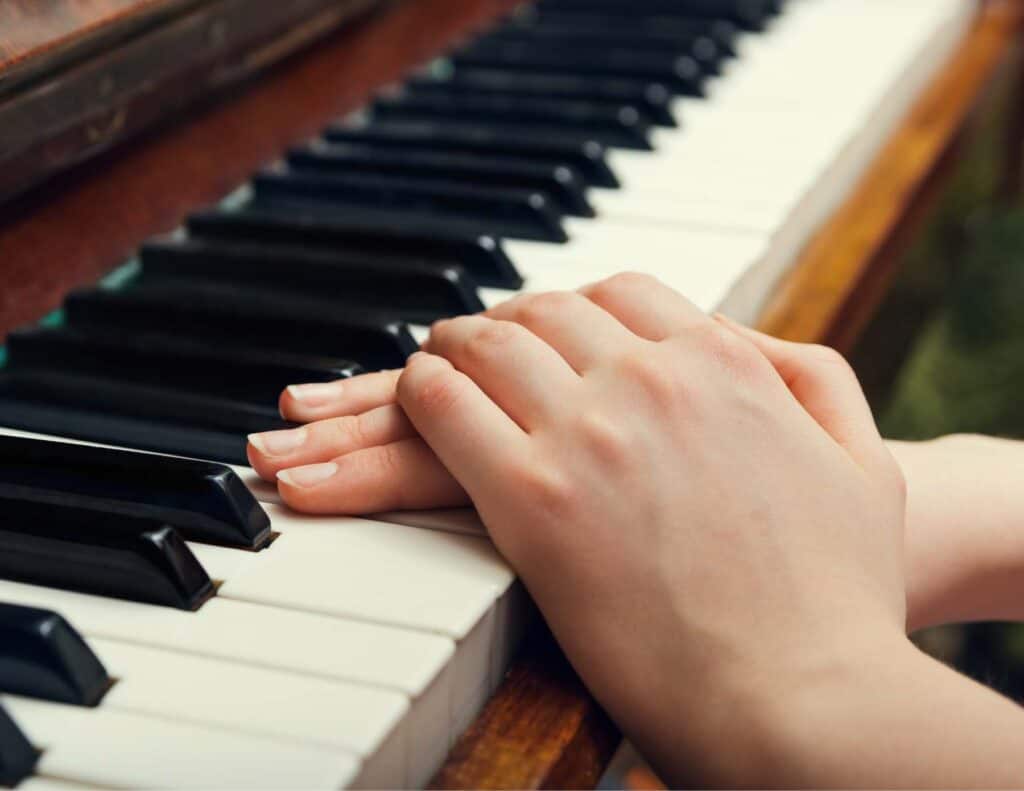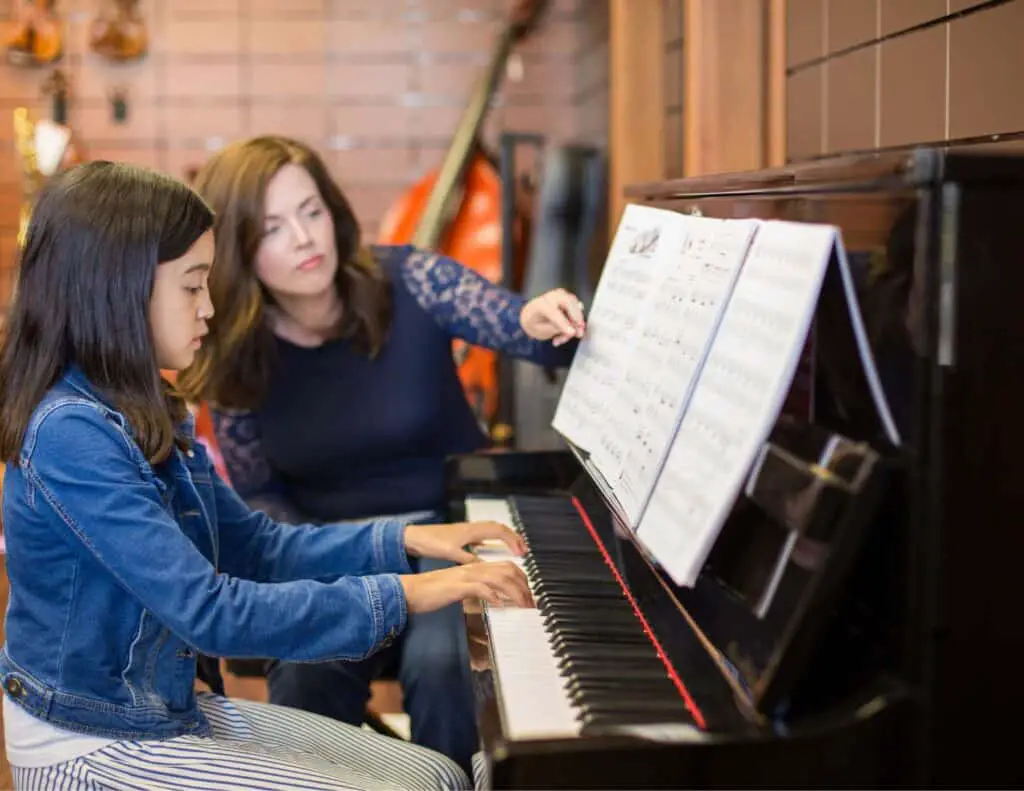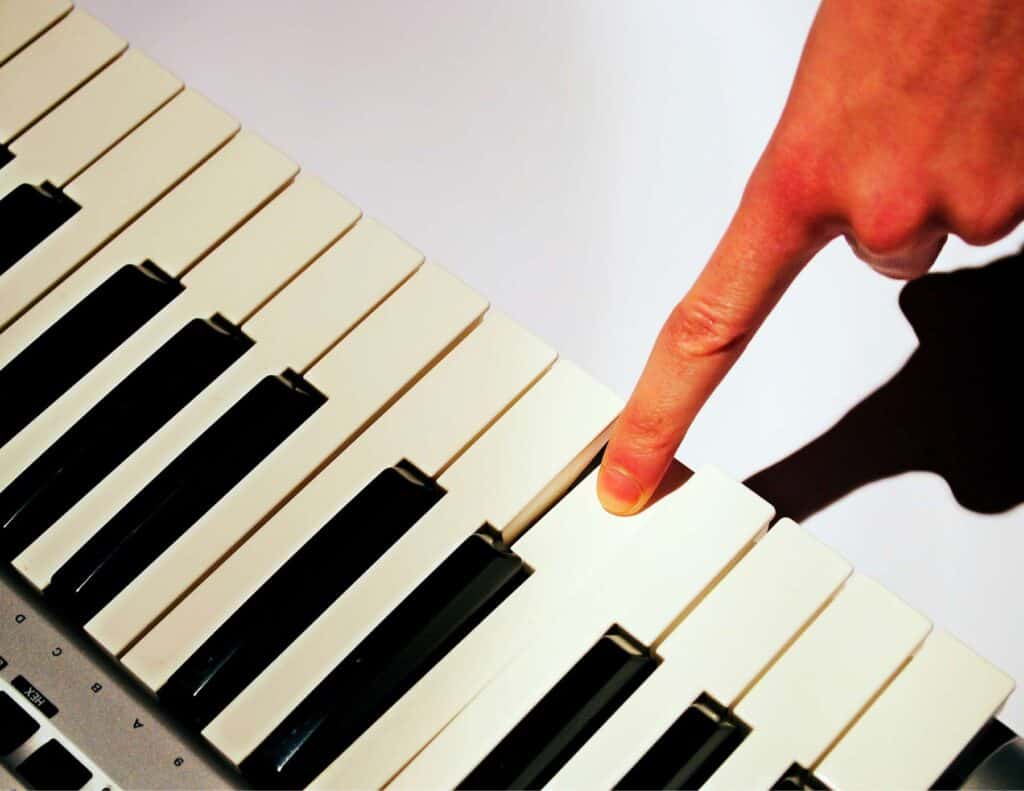
Beginner piano players often wonder how long they should practice each day in order to make progress. The answer to this question depends on several factors, such as age, skill level, and personal goals.
While there’s no one-size-fits-all answer, expert opinions can shed light on a balanced approach. Setting realistic goals and creating a practice schedule can help beginners stay motivated and make steady progress.
In this article, I’ll explore recommendations from seasoned pianists and educators, aiming to help you find a practice routine that’s just right for your journey. Whether you’re looking to master your first song or build a solid foundation, I’ve got you covered.
Key Takeaways
- Quality of practice is more important than quantity.
- Consistent practice, even for a short time each day, is more effective than sporadic, marathon sessions.
- Setting realistic goals and creating a practice schedule can help beginners stay motivated and make steady progress.
How Long Should a Beginner Practice Piano?
As a general rule, beginner students should aim to practice for 10-15 minutes a day. This may not seem like a lot, but it’s the right amount of time for younger players to stay focused on the piano.
During these shorter practice sessions, beginner pianists should focus on building a foundation of proper technique and posture.
This means practicing scales, chords, and arpeggios to warm up their fingers, as well as learning basic music theory. As their skills improve, they can gradually increase their practice time up to 30 minutes per day.
How Long Should Intermediate Pianists Practice?
Intermediate pianists should aim to practice for at least 30 minutes a day, 5-6 days a week. During these practice sessions, they should focus on refining their technique, learning new pieces, and building their repertoire.
To make the most of their practice time, intermediate pianists should structure their sessions around specific goals. This may involve breaking down a piece into smaller sections and practicing each section individually, or focusing on specific technical challenges.
How Long Should Advanced Pianists Practice?
Advanced pianists should aim to practice for at least an hour a day, 5-6 days a week. During these practice sessions, they should focus on refining their technique, building their repertoire, and preparing for performances.
To maintain their skills and continue to improve, advanced pianists may also incorporate other activities into their practice routine, such as sight-reading, improvisation, and music theory study.
How Long Should Professional Pianists Practice?
Professional pianists will practice for several hours a day, often incorporating multiple practice sessions into their daily routine. In addition to refining their technique and building their repertoire, they may also spend time rehearsing with other musicians, preparing for performances and recordings, and teaching.
To maintain their skills and continue to improve, professional pianists may also engage in other activities such as attending concerts, collaborating with other musicians, and studying with master teachers.
Intention in Practice
When it comes to practicing the piano, having a clear intention is essential for making progress. Without a specific goal in mind, it can be easy to fall into the trap of mindless repetition, which can lead to frustration and burnout.
One effective way to set an intention for practice is to break down larger goals into smaller, more manageable ones. For example, instead of aiming to master an entire piece in one practice session, a beginner might focus on mastering a particular section or technique.
Another useful approach is to set specific, measurable goals. This could involve tracking the number of correct repetitions or aiming to increase the tempo by a certain amount each day.
It’s also important to approach practice with a positive mindset. Rather than focusing on mistakes or shortcomings, beginners should celebrate small victories and use them as motivation to keep going.
Ultimately, the key to effective practice is to stay focused and engaged. By setting clear intentions and approaching practice with a positive attitude, beginners can make steady progress and build a strong foundation for their piano playing.

Understanding Piano Practice for Beginners
Firstly, it is important to understand that piano practice is not just about playing through pieces. It involves a variety of activities that aim to develop different skills, such as finger dexterity, hand coordination, note reading, and music theory. A good practice routine should include a balance of these activities, depending on the individual’s needs and goals.
Another important factor to consider is the age of the beginner. Young children may have a shorter attention span and may need more breaks, while older beginners may be able to sustain longer practice sessions.
In addition to the length of practice, the quality of practice is also crucial. Beginners should focus on playing slowly and accurately, paying attention to hand posture and finger placement. They should also break down pieces into smaller sections and practice them separately, gradually increasing the tempo as they improve. It is also helpful to practice with a metronome or backing track to develop a sense of rhythm and timing.
Finally, beginners should set realistic goals and track their progress. This can help them stay motivated and focused, and also provide a sense of accomplishment as they reach milestones. A good way to track progress is to keep a practice journal, noting down what was practiced each day and any challenges or breakthroughs.
The Importance of Consistency in Practicing
Consistency is key when it comes to learning how to play the piano. Regular practice is essential for building muscle memory, improving technique, and developing a strong foundation for more advanced skills.
Daily practice is highly recommended for beginners. Even if it’s just for a short period of time, practicing every day helps to reinforce what has been learned and keeps the fingers and mind engaged with the piano.
Consistency doesn’t necessarily mean practicing for long hours every day. In fact, it’s better to practice for shorter periods of time on a regular basis than to practice for a long time sporadically.
A beginner should aim to practice for at least 30 minutes each day, gradually increasing the practice time as progress is made. It’s also important to practice at the same time each day, as this helps to establish a routine and make practicing a habit.
Consistent practice also helps to prevent injury. Practicing for long periods of time without breaks can lead to strain on the hands and wrists, which can cause injury over time. Taking short breaks every 20-30 minutes can help to prevent this.
There are also things you can do to practice without even being at the piano. Finger exercises can help to strengthen your fingers and instill muscle memory. These can be done anywhere and at anytime. Reading your sheet music and making notes on things like dynamic markings or fingerings can also be done almost anytime and anywhere.
Setting Realistic Goals
When starting to learn the piano, it’s important to set realistic goals for your practice sessions. This will help you stay motivated and make steady progress. Setting goals that are too ambitious can lead to frustration and burnout, while setting goals that are too easy can lead to boredom and lack of progress.
One effective way to set practice goals is to break down a larger goal into smaller, more manageable steps. For example, if your ultimate goal is to play a particular song, you could break it down into learning the left hand first, then the right hand, and finally putting the two hands together.
It’s also important to set specific, measurable goals. Rather than setting a vague goal like “improve my playing,” set a goal like “practice for 30 minutes every day.” This way, you can track your progress and see how far you’ve come.
When setting practice goals, it’s important to be honest with yourself about how much time and effort you can realistically commit to practicing each day. It’s better to set smaller, achievable goals and make steady progress than to set overly ambitious goals that you can’t realistically achieve.
Finally, it’s important to remember that progress takes time. Learning the piano is a journey, and it’s important to enjoy the process rather than focusing solely on the end goal. By setting realistic practice goals and enjoying the journey, you’ll be more likely to stay motivated and make steady progress.
Creating a Practice Schedule
When starting out as a beginner piano player, it’s important to create a practice schedule to ensure consistent progress. Having a structured routine will help you stay motivated and focused on your goals.
It’s a good idea to keep a journal of your practice routine where you track things like what time you practiced, how long, what you practiced, what was difficult, and what is getting easier.
Determine Your Practice Time
The first step in creating a practice schedule is to determine how much time you have available to practice each day. It’s important to be realistic and choose a time that you can commit to consistently. For beginners, it’s recommended to practice for about 30 minutes per day, 5-6 days a week. As you progress, you can increase your practice time as needed.
Schedule Your Practice Time
Once you’ve determined your practice time, the next step is to schedule it into your daily routine. Choose a time of day when you are most alert and focused, and try to stick to the same time each day. This will help you establish a habit and make it easier to stay consistent.
Create a Practice Schedule
Now that you’ve determined your practice time and scheduled it into your routine, it’s time to create a practice schedule. A practice schedule should include specific goals and exercises that you want to work on during each practice session. Here’s an example of a beginner’s practice schedule:
| Time | Activity |
|---|---|
| 5 min | Warm-up exercises |
| 10 min | Finger exercises |
| 10 min | Sight-reading |
| 5 min | Music theory |
| 10 min | Learning a new piece |
| Total | 30 min |
Remember to be flexible with your practice schedule and adjust it as needed. If you find that a particular exercise or goal is too challenging, don’t be afraid to spend more time on it or break it down into smaller steps.

Learning Piano Pieces
Learning to play piano pieces is an essential part of becoming a proficient pianist. It is important for beginners to choose pieces that are appropriate for their skill level and gradually increase the difficulty of the pieces as they progress.
When selecting a piece, beginners should consider the following factors:
- The melody: Choose a piece with a simple melody that is easy to remember and play.
- The length: Start with shorter pieces and gradually increase the length as proficiency improves.
- The difficulty: Choose a piece that is challenging but not too difficult to play.
- Repertoire: Beginners should aim to learn a variety of pieces from different genres to build a strong repertoire.
It is recommended that beginners spend at least 30 minutes a day practicing their pieces. They should break down the piece into smaller sections and practice each section separately before putting it all together.
Classical pieces are a great starting point for beginners as they provide a solid foundation in technique and theory. As proficiency improves, beginners can start exploring other genres such as jazz, pop, and rock.
Technical Skills Development
Technical skills include coordination, sight-reading, arpeggios, scales, and chords. These skills are fundamental to playing the keyboard and advancing to higher levels.
Coordination is a critical skill that beginners must develop. It involves the ability to use both hands simultaneously to play different notes and rhythms. To develop this skill, beginners can start with simple exercises that involve playing different notes with each hand. As they progress, they can move on to more complex exercises that involve playing chords and melodies together.
Sight-reading is another essential skill that beginners must develop. It involves the ability to read and play music at the same time. Beginners can start by learning to read simple melodies and gradually progress to more complex pieces.
Arpeggios are a series of notes played in succession, usually in a specific pattern. They are an essential part of piano playing and can help beginners to develop finger strength and dexterity. Beginners can start with simple arpeggios and gradually progress to more complex patterns.
Scales and chords are also fundamental to piano playing. Scales are a series of notes played in a specific pattern, while chords are a group of notes played together. Beginners should focus on learning basic scales and chords and gradually progress to more complex ones.
Understanding Piano Levels and Progressions
Piano levels are typically divided into beginner, intermediate, and advanced. Each level has specific criteria, but there are variations within each level. For example, a beginner might choose to teach themselves to play or take lessons with a teacher.
Progression through the levels is based on a combination of factors, including the amount of time spent practicing, the level of commitment, and the current skill level. It’s important to note that progress is not always linear and can vary from person to person.
To help track progress, many piano teachers use a grading system. The grading system typically consists of a series of exams or assessments that test a student’s knowledge and skills. Students are then graded on a scale from 1-8, with 1 being the beginner level and 8 being the advanced level.
As a beginner, it’s important to set realistic goals and practice regularly. It is recommended to practice for at least 30 minutes to 1 hour daily. However, the ideal daily practice time varies based on individual goals, commitment level, and current skill level.
In addition to regular practice, it’s also important to focus on specific skills such as scales, chords, and chord progressions. Incorporating these skills into daily practice can help improve overall playing ability and lead to faster progression through the levels.
Quality Over Quantity
Practicing for hours on end without proper focus and attention will not yield the same results as focused, intentional practice for a shorter amount of time.
Quality practice involves setting specific goals and working towards them with focus and attention. This means breaking down a piece of music into smaller sections and working on each section until it is mastered before moving on to the next. It also means paying attention to proper technique, posture, and hand position.
One way to ensure quality practice is to use a timer. Set a timer for a specific amount of time, such as 30 minutes, and focus solely on the task at hand during that time. Take breaks as needed, but make sure to come back to the task with renewed focus and attention.
Another important aspect of quality practice is to listen to oneself while playing. This means paying attention to the sound produced and making adjustments as needed. It also means being mindful of tension in the body and making adjustments to release that tension.

The Mental Aspect of Practice
When it comes to practicing the piano, the mental aspect is just as crucial as the physical. Concentration and focus are key to making progress and building skills.
One technique that can help with the mental aspect of practice is mental practice. This involves studying and visualizing a piece of music away from the piano. It can help a pianist keep a clear goal in mind when practicing and avoid establishing bad habits.
Another important aspect is setting realistic goals for each practice session. By breaking down a piece of music into smaller sections and focusing on one at a time, a beginner can build up their skills and confidence. It is also important to take breaks and not push oneself too hard, as mental fatigue can set in and hinder progress.
Finally, it is important to approach practice with a positive mindset. Learning to play the piano takes time and effort, and mistakes are a natural part of the process. By accepting and learning from mistakes, a beginner can improve their skills and enjoy the journey of learning to play the piano.
Importance of Good Habits and Commitment
Good habits and commitment are essential for anyone who wants to learn to play the piano. Without them, progress will be slow, and frustration will set in quickly. Developing good habits and committing to regular practice will help beginners stay motivated and focused on their goals.
One of the most critical habits to develop is consistency. Beginners should aim to practice for a set amount of time each day, even if it’s just 15 or 20 minutes. This will help them build muscle memory and reinforce concepts learned in previous sessions. Skipping days or only practicing sporadically will hinder progress and make it harder to achieve long-term goals.
Another essential habit is setting achievable goals. Beginners should start with simple pieces and gradually work their way up to more challenging material. Setting unrealistic goals will only lead to frustration and disappointment. By setting achievable goals, beginners can build confidence and stay motivated.
Commitment is also crucial. Learning to play the piano takes time and effort, and progress may be slow at first. Beginners need to commit to regular practice and be patient with themselves. They should also be willing to seek help when needed, whether it’s from a teacher or online resources.
Finally, it’s essential to develop good practice habits. Beginners should focus on quality over quantity, taking breaks when needed and avoiding practicing for too long without rest. They should also practice with proper technique, using correct hand positioning and posture to avoid injury.
Flexibility and Relaxation
Beginner piano players often feel tense and stressed when practicing. However, it is important to remember that practicing should be enjoyable and not a source of stress. Flexibility and relaxation are key components to successful piano practice.
To achieve flexibility, it is important to warm up before playing. This can include stretching exercises for the fingers, hands, and arms. It is also important to maintain good posture while playing to avoid unnecessary tension in the body.
Relaxation is essential for proper technique and to avoid injury. Tension in the body can lead to strain and discomfort, which can hinder progress. To achieve relaxation, it is important to take breaks during practice sessions and to not push too hard.
It is also important to find a comfortable playing position and to avoid unnecessary tension in the hands and arms. This can be achieved through proper technique and posture.
Resources for Piano Practice
When it comes to piano practice, having the right resources can make all the difference. Here are some resources that beginners can use to help them develop their skills and stay motivated.
Piano Method Books
Piano method books are an excellent resource for beginners. These books are designed to provide a structured approach to learning the piano, with lessons that build upon each other. Some popular piano method books for beginners include:
- Alfred’s Basic Piano Library
- Bastien Piano Basics
- Faber Piano Adventures
Each of these series has multiple levels, so beginners can progress at their own pace.
Online Piano Lessons
Online piano lessons can be a convenient and affordable way for beginners to learn the piano. There are many websites and apps that offer online piano lessons, including:
- Piano Marvel
- Playground Sessions
- Skoove
These programs typically include video lessons, interactive exercises, and progress tracking.
Practice Apps
Practice apps can help beginners stay motivated and focused during their practice sessions. Some popular practice apps for piano include:
- Piano Maestro
- Simply Piano
- Flowkey
These apps offer a variety of features, such as gamified practice exercises, real-time feedback, and progress tracking.
Sheet Music Websites
Sheet music websites can provide beginners with a wide variety of music to practice. Some popular sheet music websites include:
- Musicnotes
- Sheet Music Plus
- IMSLP
These websites offer sheet music for a range of skill levels and musical genres.
Playing Popular Music and Playing by Ear
For many beginner piano players, the ultimate goal is to play popular music. While sheet music is available for many popular songs, playing by ear can be a valuable skill to develop. Playing by ear allows musicians to learn and play songs without the need for sheet music, which can be especially useful for those who want to play popular music that may not have sheet music readily available.
One way to develop playing by ear skills is through ear training exercises. These exercises can help beginners learn to identify intervals, chords, and scales by ear. Once these skills are developed, it becomes easier to play by ear and learn popular songs without sheet music.
Another way to develop playing by ear skills is to listen to recordings of popular songs and try to play along. This can help beginners develop their ability to hear melodies and chords and reproduce them on the piano. It is also important to pay attention to the rhythm and timing of the song, as this can be just as important as the notes themselves.
It is worth noting that playing by ear and playing from sheet music are not mutually exclusive skills. Many musicians use a combination of both when learning and playing songs. However, developing playing by ear skills can be a valuable addition to a beginner’s toolkit, especially for those interested in playing popular music.
The Role of Age in Piano Practice
Kids Aged 4-6
Young children have a shorter attention span and may find it challenging to focus for more extended periods. Therefore, it is recommended that they practice for 15 to 20 minutes of supervised piano practice each day.
Kids Aged 5-10
As children grow older, they can gradually increase their practice time. For kids between the ages of five and ten, 30 minutes of practice per day may be a bit much to begin with. They can start with 15-20 minutes a day and gradually build up to 30 minutes as their focus increases.
Kids 11+ and Young Adults
For teenagers and adult beginners, it is recommended that they practice at least 30 minutes a day, six days a week. Once they have developed a proper working methodology, a practice regimen of 45 minutes to an hour five to seven days a week should be considered mandatory.
It is important to note that while age is a factor, it is not the only determining factor. Each individual is unique, and their ability to focus and learn may vary. Therefore, beginners should listen to their bodies and practice according to their own pace and ability.
The 30-Minute Daily Practice Rule
For beginners learning to play the piano, it’s important to establish a regular practice routine to improve their skills. One common recommendation is to practice for 30 minutes each day. This may seem like a small amount of time, but it can be effective in building a foundation of proper technique and posture.
The 30-minute daily practice rule is a good starting point for beginners. It allows them to focus on specific exercises and pieces without feeling overwhelmed or fatigued. It’s important to note that the quality of practice is more important than the quantity of practice. A focused and productive 30-minute practice session can be more beneficial than a distracted and unproductive hour-long session.
When practicing for 30 minutes, beginners should establish a structured routine that includes warm-up exercises, scales, and pieces they are working on. It’s important to break up the practice time into manageable segments to avoid mental and physical fatigue. For example, a beginner may spend 10 minutes on warm-up exercises, 10 minutes on scales, and 10 minutes on a piece they are working on.
It’s also important to note that the 30-minute daily practice rule is a starting point and may not be enough for more advanced players. As a beginner progresses, they may need to increase their practice time to continue improving their skills. However, it’s important to avoid over-practicing, as this can lead to physical and mental fatigue and may hinder progress.

Muscle Memory and Skill Level
Muscle memory is a crucial aspect of learning to play the piano. It is the ability of the muscles to remember the movements involved in playing a particular piece. The more a beginner practices, the more the muscles become familiar with the movements, and the easier it becomes to play the piano.
However, the amount of time it takes for muscle memory to develop varies depending on the skill level of the beginner. For instance, beginners who are just starting may need to practice for longer periods to develop muscle memory compared to those who have been playing for a while.
As a general rule, beginners should aim to practice for at least 30 minutes per day, five to six days a week. This practice time can be divided into shorter practice sessions of 10-15 minutes each to avoid fatigue and burnout.
It is important to note that muscle memory alone does not guarantee proficiency in playing the piano. Beginners should also focus on developing proper technique, posture, and finger strength to play with precision and accuracy.
To enhance muscle memory, beginners can use various practice techniques such as repetition, slow practice, and breaking down a piece into smaller sections. Practicing regularly and consistently is also crucial in developing muscle memory.
Frequently Asked Questions
What is the recommended daily practice time for beginner piano players?
For young children (around four to six years of age), 15 to 20 minutes of supervised piano practice is good. For older beginners, it is recommended to practice for about 30 minutes per day, 5 or even 6 days a week. As a beginner, the main goal is to build a foundation of proper technique and posture. Practicing more than this amount each day is not necessary at this point.
Is practicing piano for an hour each day sufficient for a beginner?
Practicing piano for an hour each day as a beginner is not necessary and could lead to frustration or burnout. It is more important to focus on quality practice time rather than quantity. It is recommended to start with 15 to 30 minutes of practice time, five days a week, and gradually increase the time as skills improve.
How long does it typically take for a beginner to play piano with both hands?
It varies from person to person, but it typically takes a few weeks to a few months for a beginner to play piano with both hands. It is important to start with simple songs and exercises and gradually increase the difficulty level. Consistent practice and patience are key to improving hand coordination and dexterity.
How long should a child practice piano each day to improve?
For young children, it is recommended to practice piano for 15 to 20 minutes per day, under the supervision of an adult. As the child gets older and more experienced, the practice time can be gradually increased to 30 minutes per day, five days a week.
What is a reasonable amount of time for a beginner to practice piano per day?
A reasonable amount of time for a beginner to practice piano per day is 15 to 30 minutes, five days a week. It is important to focus on quality practice time rather than quantity. As skills improve, practice time can be gradually increased.
How good should a beginner be at piano after one year of practice?
It is difficult to measure progress in a specific amount of time, as progress varies from person to person. However, after one year of consistent practice, a beginner should be able to play simple songs with both hands, have a basic understanding of music theory and be able to read sheet music. It is important to remember that progress takes time and patience, and everyone learns at their own pace.
